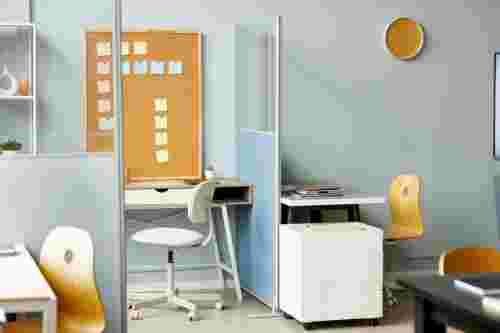


Learn why modern businesses are investing in cubicles that support better posture, health, and workplace efficiency.
In the modern workplace, employee comfort and productivity go hand-in-hand. As more companies prioritize wellness, creating an environment that supports both health and efficiency has become essential. One of the most effective ways to achieve this is by investing in ergonomic cubicle solutions. These systems not only promote better posture and reduced fatigue but also contribute to a more organized and inspiring workspace. If you’re exploring how to enhance your office design, it’s time to look at how cubicles can be customized for maximum ergonomic benefit.
Ergonomics is the science of designing a workplace to fit the needs of its users. When applied to cubicles, it ensures that employees can work comfortably for long periods without experiencing physical strain. Poor ergonomics, such as incorrect desk height or unsupportive chairs, can lead to chronic pain, decreased morale, and higher absenteeism.
Modern cubicles designed with ergonomics in mind offer a combination of functionality, flexibility, and health support. These intelligent designs empower employees to focus better, move freely, and experience fewer distractions—all leading to higher performance and satisfaction.
Although open offices once dominated workplace trends, many companies are now returning to cubicles for good reasons. The right cubicle layout provides:
Acoustic privacy to reduce distractions
Defined personal space for organization
Customization for various roles
Physical separation to minimize illness transmission
Combining these benefits with ergonomic design takes office comfort and performance to the next level.
To truly optimize comfort and health, ergonomic cubicles integrate various features designed to support the body and encourage better work habits. Here are the most essential elements:
Sit-stand desks are increasingly popular in modern cubicles. These adjustable surfaces allow employees to alternate between sitting and standing throughout the day, reducing sedentary time and improving circulation.
High-quality, adjustable chairs with lumbar support are critical to preventing back pain and enhancing posture. Ergonomic cubicles should include chairs that support a full range of motion and accommodate users of different heights.
To avoid neck and eye strain, monitor placement is key. Ergonomic cubicles often include adjustable monitor arms that let users set the ideal screen height and distance.
Pull-out or adjustable keyboard trays keep wrists in a natural, neutral position. This reduces the risk of repetitive strain injuries such as carpal tunnel syndrome.
Ergonomic cubicles often include accessories like footrests to support proper leg posture, and anti-fatigue mats for standing desks to reduce foot and leg fatigue.
Organized cables reduce clutter and the risk of tripping. Built-in cable trays and power hubs streamline tech usage in ergonomic cubicles.
Employees who spend long hours at their desks can experience various health issues if their workspace isn’t properly designed. By switching to ergonomic cubicle systems, you can help minimize:
Lower back and neck pain
Eye strain and headaches
Wrist and shoulder fatigue
Poor circulation and leg swelling
Reduced mental clarity due to discomfort
Incorporating ergonomic principles into cubicles isn’t just a trend—it’s an investment in long-term employee wellness and productivity.
In an era where businesses compete for top talent, offering an ergonomic and comfortable workspace can be a true differentiator. When you invest in cubicles designed to support physical well-being, you show your employees that their health matters.
Modern ergonomic cubicle solutions bridge the gap between comfort and productivity. Whether you’re renovating an outdated office or setting up a new space, choosing ergonomically optimized cubicles is a smart move for your business and your team.
